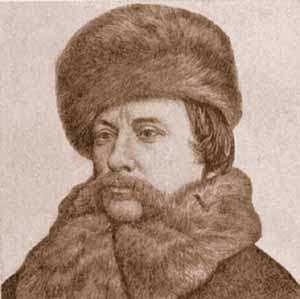SAINTS, MYSTICS AND VILLAINS OF PETERSBURG
MYSTICAL PETERSBURG
MYSTICS OF PETERSBURG
The phenomenon of Constantine Leontiev

Constantine Nikolaevich Leontiev was born on January, 13th, 1831 in village Kudinov of the Kaluga gubernia (province). His father, Nikolay Borisovich Leontiev, - a nobleman, mother, Feodosiya Petrovna, occurs from an ancient noble family of Karabanovy. Constantine was the younger, seventh child in the family.
The inner world of Constantine Leontiev since the earliest childhood has been fileed by religious experiences, - but nevertheless they have mainly been turned to "external forms of church life" as he mentioned later in the letter to V. Rozanov.
From the childhood, Konstantin Nikolaevich has fond of divine services øò church, and aesthetically filled by them.
For the thinker have for ever incorporated in memoirs mother and beauty of the patrimonial house with pure, spaced rooms, silence, books, a room of mother (which was decorated by portraits of seven children), kinds on a pond and a magnificent garden.
The image of Russia during a time of his diplomatic activity was supported in his mind by these memoirs.
In 1851 Leontiev writes the first work, a comedy "Marriage on Love".
In 1868 his article "Literacy and a nationality", met an approval of ambassador N.P.Ignatyev, the well-known Slavophile and has been published. During the same time Leontiev works over an extensive series of novels "River of times" which covered Russian life from 1811 to 1862 years. But the most part of manuscripts later has been destroyed by himself.
In a year Leontev has been appointed by the consul in the Albanian city of Yanin which climate, however has negatively affected on his health.
During this moment of Leontiev which made brilliant diplomatic career, and prepared for a post of the consul general in Bohemia. However in 1871 there is an event which had a defining value for the subsequent life of Leontiev.
In July Leontiev suddenly falls ill with illness which he has accepted as a cholera. When the death seemed already inevitable, he has suddenly seen an icon of Thetokos which was presented to him by Athos monks.
Leontiev has sworn that in case of recover, he will accept monkness. ìîíàøàñòâî. In two hours he has lightened.
Right after how his illness has receded, Leontiev has gone through mountains to Athos where it remained till August, 1872. Constantine was going to keep the promise and to become the monk, but his Athos confessors have dissuaded him from such hasty step.
In 1872-1874 Leontiev lives in Constantinople and on an island of Halki, - this period of his life was rather fruitful. First of all in these years Leontiev opens itself as the talented publicist ("Panslavizm and Greeks", "Panslavizm on Athos"). His well-known work "Byzantism and Slavic people" concerns the same issues ( and also the novel "Odysseus of Polihroniades").
In 1874 Leontiev comes back to a motherland - native Kudinovo and finds it in the big desolation. In August Leontev makes the first trip to Optina Desert (famous strong-orthodoxal monastery) where meet the aged man (starets) St. Amvrosy to whom he had a letter from Athos monks, and gets acquainted to St. Kliment of Zedergolm.
In November, 1880 Leontev arrives on service in the Moscow Acceptable Committee. As a censor Leontev has served for six years.
At this time Leontev wrote a little (the novel "Egyptian pigeon", articles "About the world love", "Fear of God and love to mankind"). In 1885-86 the collection of his articles "The East, Russia and Slavic people" was published.
In the beginning of 1890 he met Leo Tolstoy who has spent at it two and a half an hour, left on disputes on belief.
In Optina monastery he writes such works, as "Notes of the eremite", "The National policy as the tool of the world revolution", "The Analysis, style and trend", etc.
On August, 23rd, 1891 in Predtechevom to a desert Leontev Optinoj monastery has accepted secret monk initiation with a name of Kliment.
On November, 12th, 1891 Konstantin Nikolaevich has died from a pneumonia and has been buried in the Gefsimansky garden near to the Trinity-Sergieva Lavra.
Source: Short biography of K.N.Leontev's